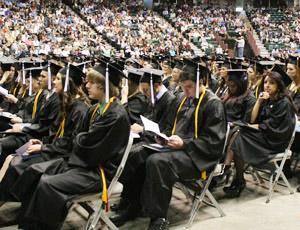
By Anne Marie Amacher
MOLINE, Ill. — Joan Rosenhauer told of how Ethiopian women had to walk four hours to the nearest water source and another four hours carrying the water back to their village. She shared how Catholic Relief Services brought water and sanitation to the village and brought hope to the people there.
Rosenhauer, vice president for U.S. operations of Catholic Relief Services, told graduates of Davenport’s St. Ambrose University how they, too, can make a difference anywhere in the world. She was the commencement speaker for the university’s May 14 spring graduation at the iwireless Center in Moline, Ill.
She also shared a story about fighting for funds for plumbing for residents just outside the U.S. Capitol when she was working for the U.S. Conference of Catholic Bishops.
Because of her passion for social justice, Rosenhauer was encouraged at what St. Ambrose has done in the Quad-City community for social justice. “Clearly, St. Ambrose is a place that takes Catholic social teaching seriously, where a commitment to social justice is part of the fabric of every student’s experience.”
She asked the graduates to consider how they will carry out their commitment to social justice after graduation. There are many ways to promote social justice locally in the Quad-City area, and overseas as well, she noted. “But frankly, when I speak to groups across the country and ask them how they are promoting justice in a globalized world, I often find that people’s eyes begin to glaze over. They think having an impact on the other side of the globe has little connection to their lives.” But people are connected to one another and making a commitment to work toward justice in the poorest countries and communities on earth ought to be an essential part of social justice, Rosenhauer said.
She shared the details of her recent trip to Ethiopia in which CRS brought water and sanitation to a village. The project included an “arborloo,” which is building of an outhouse over a pit for human waste, using ash to cover the odor, then moving the outhouse to another location after the pit is full and planting trees in that spot.
“This project was made possible by people like you and me — from the people who used their education to develop the arborloo design to the staff and volunteers who helped carry out the project; to donors who helped raise the funds; to U.S. taxpayers who provided foreign assistance to the project. People like you and me transformed the lives of the people in that village in Ethiopia.”
So what can you do to promote global justice, she asked the graduates. Then she offered suggestions: Pray for peace, learn about issues, act and give money.
With regards to acting on the issue of global justice, Rosenhauer gave two examples of how everyone can help make a difference. The first has to do with choices people make as consumers. “Do we choose products that are safe for the environment and are produced by workers receiving a decent wage?” She talked about CRS’s fair trade projects that include selling coffee, chocolate and handcrafted goods produced by workers who receive just wages and are working in decent and safe conditions.
Another example is choices people make as citizens. “My work at Catholic Relief Services and before that at the U.S. Conference of Catholic Bishops has shown me over and over again the impact individuals like us can have on shaping the role that our country plays in promoting a world of greater justice and peace.”
She said the U.S. has a leadership role to play in determining whether the world prioritizes policies that advance peace and create greater economic opportunities for the most desperately poor people around the world. This nation’s citizens have a unique role to play in shaping U.S. policies, she said.
“What I hope you’ll remember about the speaker at your graduation is her message that at every stage of our lives, but especially at moments like this when education is opening new possibilities, each of us has both opportunities and responsibilities to impact our world.
“We make choices every day that can play an important role in promoting global justice and peace. And when there are people in our world like those in eastern Ethiopia whose lives can be so transformed, whose children can be kept alive, just by giving them a decent outhouse and a community spigot, how can we not respond?”








